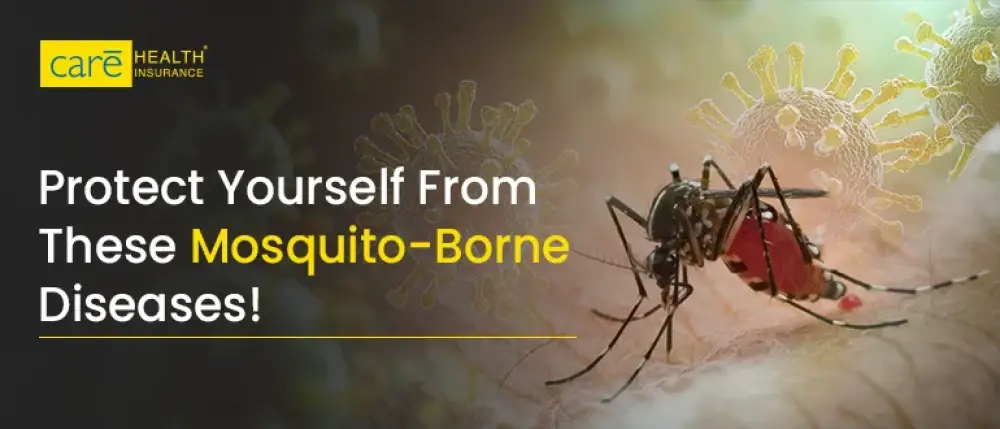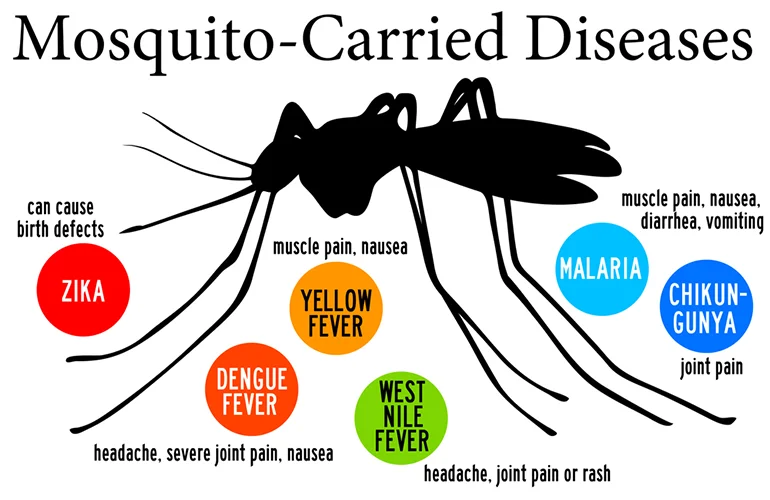Subscribe to get weekly insights
Always stay up to date with our newest articles sent direct to your inbox
Published on 21 Apr, 2025
Updated on 13 Nov, 2025
185 Views
6 min Read

Written by Sejal Singhania
Reviewed by Munmi Sharma
favorite0Like
favoriteBe the First to Like
If you’ve been keeping up with recent health news, you might have seen headlines like “dengue fever cases rising” or “mosquito-borne Chikungunya virus” popping up all over online. Whether you're wandering the busy streets of Delhi or unwinding on stunning tropical islands, mosquitoes pose a serious threat to human life by transmitting diseases.
These small creatures are responsible for spreading some of the world's most serious diseases, affecting millions of people each year. In India, after every monsoon, diseases like malaria, dengue, chikungunya, and Zika seem to return. But why does this happen, and what can you do to protect yourself?
Let’s review the deadliest mosquito diseases, their symptoms, prevention methods, and financial preparedness for potential medical emergencies.
Did you know that these tiny creatures, mosquitoes, are responsible for over 17% of all infectious diseases and cause more than 700,000 deaths each year ? These mosquitoes carry parasites, bacteria, or viruses. It's truly astonishing how mosquitoes are responsible for spreading more diseases than any other creature on Earth. It's a reminder of how important it is to protect ourselves from bites and stay vigilant.

When a mosquito bites someone who is infected with a virus or parasite, it collects that germ. Later, when it bites another person, it can transmit the infection through its saliva. This process is what doctors refer to as vector-borne disease, in which the mosquito acts as the “vector” that carries and spreads the infection.
Before exploring the major diseases they can transmit through mosquitoes, let’s first understand when mosquitoes are most active and likely to bite.
Symptoms of mosquito-borne diseases often start with general signs that resemble those of common viral infections. However, the specific symptoms can differ based on the disease type and the body's response. Common mosquito disease symptoms include:

Mosquitoes seem small, but their impact is profound. Let’s take a moment to look at the dangerous diseases that just one mosquito bite can spread, along with their symptoms, so we can better protect ourselves and our loved ones.
Malaria is caused by parasites transmitted through the bites of infected Anopheles mosquitoes. It is among the oldest and most common mosquito diseases known to humans.
Symptoms of Malaria
Prevention Tip
Remember to use mosquito nets when sleeping and keep stagnant water away from your home to prevent breeding. If travelling to malaria-prone areas, take the recommended medication. Staying proactive keeps you safe and comfortable.
Dengue is primarily transmitted by the Aedes aegypti mosquito, which usually bites during daylight hours. Some individuals with dengue may experience complications such as internal bleeding, shock, and even death. Severe cases of dengue require close hospital monitoring.
Symptoms of Dengue
Prevention Tip
Be sure to empty flower pots, coolers, and tanks each week. Don't forget to use mosquito repellents during the daytime as well, to keep your outdoor space comfortable and safe.
Zika fever, also called Zika virus disease or Zika, is a disease transmitted by Aedes mosquitoes. Women infected with Zika during pregnancy may have children with severe health issues, such as microcephaly, leading to lifelong disabilities. That's why the Zika virus is a genuine concern in areas where it's spreading quickly.
Symptoms of Zika Virus
Prevention Tip
To prevent mosquito bites during pregnancy, use protective screens or nets around yourself. These easy precautions can help ensure your safety and comfort.
Chikungunya is a viral disease spread to people through infected Aedes aegypti mosquitoes, the same mosquitoes that also carry dengue. It can significantly impact daily life, especially when joint discomfort persists, which can be more challenging for older adults or anyone with existing health conditions. Since it shares symptoms with Zika and dengue, there's a risk of misdiagnosis, especially in areas where these diseases are widespread.
Symptoms of Chikungunya
Prevention Tip
Wear full-sleeved clothes and use repellents during the day to stay comfortable and protected.
Yellow fever is a viral hemorrhagic disease transmitted by Aedes mosquitoes. It affects 47 countries, with 13 in the Americas facing the highest risk of outbreaks, including Brazil, Mexico, and Colombia. The name 'yellow' refers to the jaundice that some patients experience. According to a recent report by the World Mosquito Program , over 30,000 people lose their lives to this disease every year worldwide.
Symptoms of Yellow Fever
Prevention Tip
A vaccine is now available and required for travel to some countries, making it easier for you to stay safe and enjoy your adventures.
West Nile virus is transmitted by Culex mosquitoes, which are single-stranded RNA viruses belonging to the Flavivirus genus. They can be found in the blood of some infected birds. The virus mainly reaches humans through the bite of infected Culex mosquitoes. These mosquitoes become infected when they feed on infected birds, which are the virus's primary hosts. West Nile virus is more commonly found in parts of Africa, Europe, and North America, but cases have also been reported in other regions.
Symptoms of West Nile Fever
Prevention Tip
Apply repellents at dusk and dawn, and limit outdoor lighting to reduce mosquito attraction.
Lymphatic filariasis, commonly called elephantiasis, is a parasitic disease spread by mosquitoes such as Culex, Anopheles, and Aedes. It leads to painful swelling in the limbs, breasts, or genitalia and is caused by roundworm parasites that harm the lymphatic system. The infection spreads from person to person through bites from infected mosquitoes.
Symptoms of Lymphatic Filariasis
Prevention Tip
Mass drug administration programmes help prevent its spread. Keep surroundings dry and clean to minimise mosquito breeding sites.
Several factors contribute to the spread of mosquito-borne diseases. These are listed below:
Hence, proper sanitation and hygiene measures must be implemented at home and in public places to check the spread of mosquito-related diseases.
Nobody wants itchy bites or to risk the diseases mosquitoes can transmit. Here are some simple, everyday tips to protect yourself from these mosquito diseases.
Prevention Tips for Home & Outdoors
Prevention Tips for Travelling
It is important to note that specific data and trends can vary from year to year. For the most up-to-date information, readers should always refer to the latest reports from health authorities such as the National Centre for Disease Control (NCDC) and the Ministry of Health and Family Welfare.
Furthermore, it is essential to plan your finances for health emergencies. The best way to do so is to secure adequate health coverage against critical illnesses.
While a single mosquito bite may seem harmless, the expenses for treating diseases like dengue or malaria can add up and impact your finances. That’s why having a good health insurance plan is so important- it’s a smart safeguard. With the right coverage, you'll enjoy benefits like cashless hospitalisation, diagnostic help, and a sense of security whenever you face medical emergencies.
Pro Tip: Choose a family health policy that covers vector-borne and seasonal diseases to protect your entire family year-round.
Mosquitoes might be small, but they can carry serious diseases like dengue, malaria, chikungunya, and Zika, which can really affect your health, daily routine, and budget. Just one bite can lead to illness and unexpected medical expenses. To stay safe, keep your environment clean, remove any standing water, and use mosquito nets or repellents, especially during their peak activity. Having good health coverage is also essential for managing medical costs and focusing on getting better. By staying alert and protecting your loved ones year-round, you can keep yourself safe from mosquito-borne illnesses.
Disclaimer: It is essential to verify the policy details and coverage with the official policy documents. Also, kindly consult a medical professional to confirm the details of your health concerns.
favoriteBe the First to Like
Thyroid : मामूली नहीं हैं महिलाओं में थायराइड होना, जानें इसके लक्षण और घरेलू उपचार Vipul Tiwary in Diseases
शुगर कंट्रोल कैसे करे? जानें, डायबिटीज में क्या खाना चाहिए Vipul Tiwary in Health & Wellness
हाई ब्लड प्रेशर को तुरंत कंट्रोल कैसे करें? देखें इसके उपाय Vipul Tiwary in Diseases
पैरों में दर्द किस कमी से होता है? जानें, इसके घरेलू इलाज Vipul Tiwary in Health Insurance Articles
10 Best Fruits That Help You Lose Weight Naturally! Sejal Singhania in Diet & Nutrition
Leukaemia vs. Lymphoma Breakdown: What Sets Them Apart Leena Khowal in Diseases
Pregnancy Made Simple: Foods, Tips, and Mistakes to Avoid Sambriddhi Sharma in Diet & Nutrition
Ready to Transform Your Skin With Prebiotics, Probiotics & Postbiotics? Pratham Gupta in Diet & Nutrition
Yes, mosquitoes can transmit diseases to humans and animals through their bites.
Mosquitoes can carry and transmit several other diseases, such as Yellow Fever, Japanese Encephalitis, West Nile Virus, and Lymphatic Filariasis (Elephantiasis).
Even today, mosquitoes continue to transmit many deadly diseases such as malaria, dengue, and others, affecting millions of people annually.
High fever, severe headache, eye pain, body aches, joint pain, nausea, vomiting, and skin rash are the early signs of dengue.
Yes, implementing proper hygiene, environmental management, and personal protection can prevent many mosquito-borne diseases.
Yes, diseases such as dengue and malaria can incur high treatment expenses, so having comprehensive health insurance helps safeguard your savings.
Always stay up to date with our newest articles sent direct to your inbox
Loading...